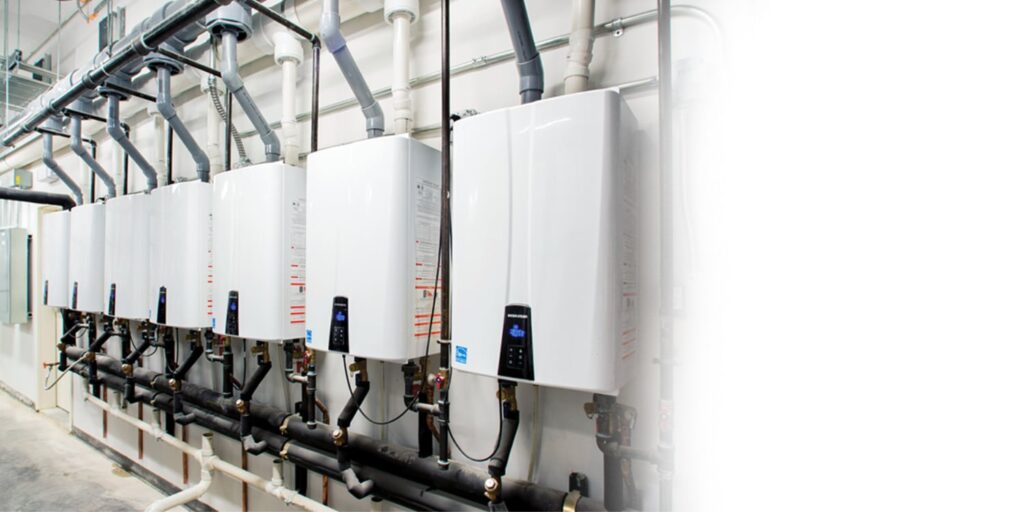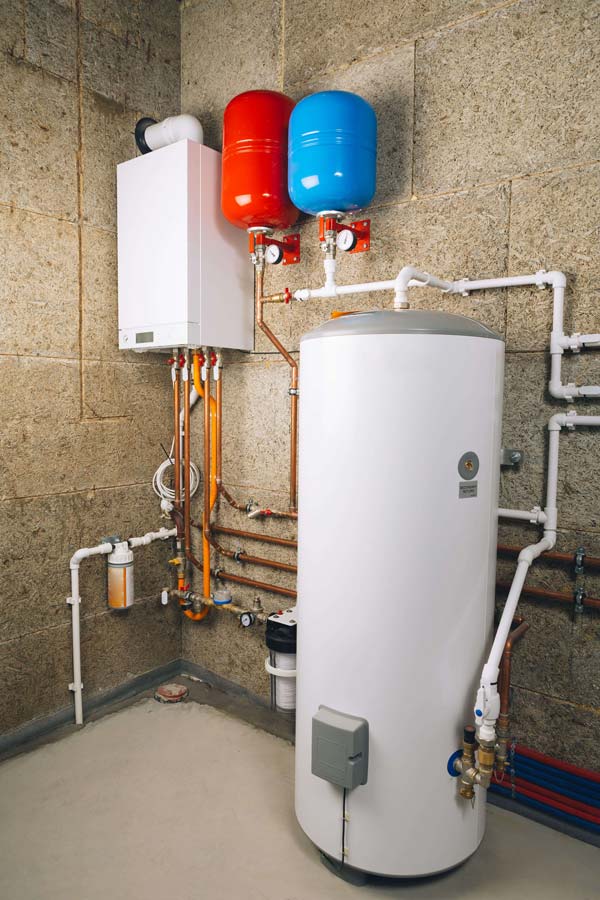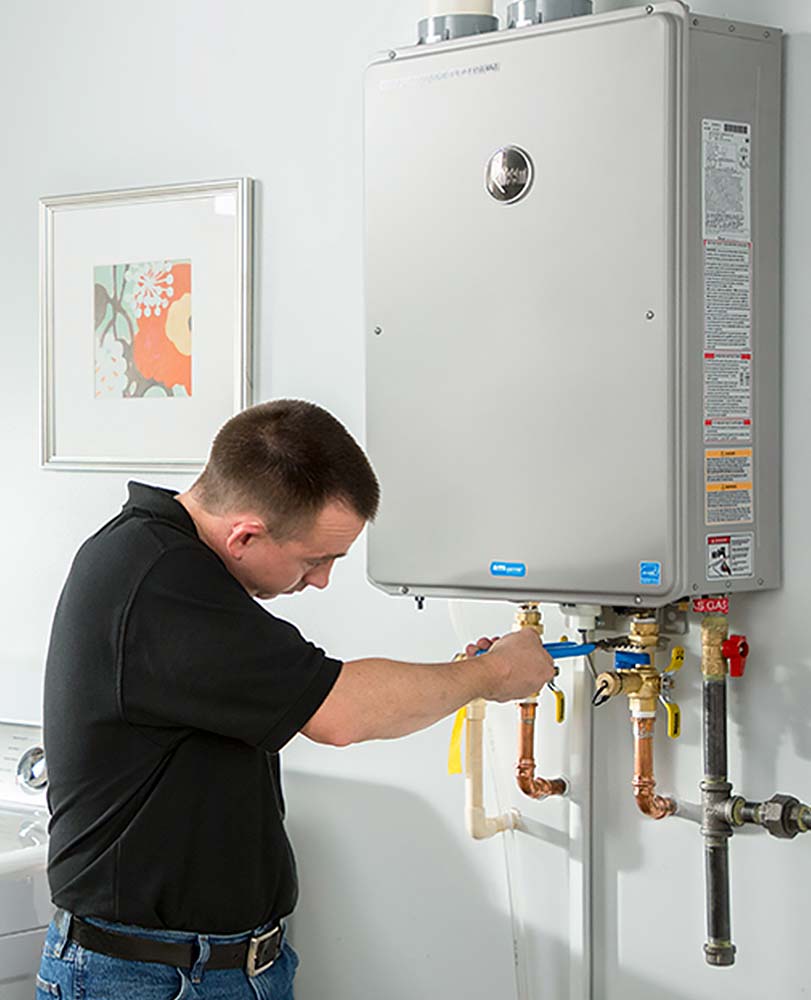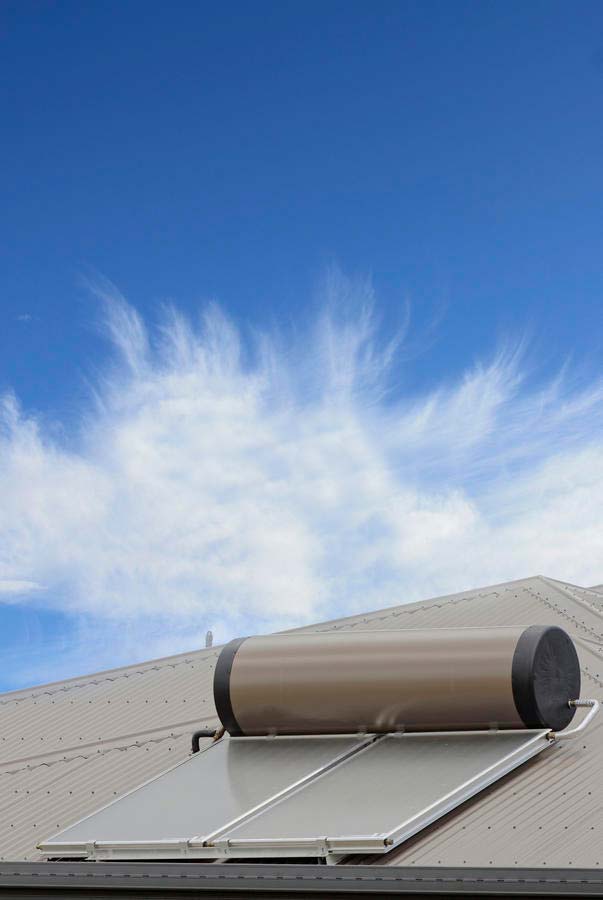This Article was updated on: January 5th, 2022
Your water heater is a vital part of your home, providing the hot water your home needs for washing clothes and dishes, bathing, and more. Picking the right water heater will ensure that you not only have a steady supply of water but that it also is produced with a minimal amount of energy, saving you money and protecting our environment.
In this guide we’ll examine different types of water heaters and the fuels they use, plus examine the advantages and disadvantages of each type, so you can make a smart decision on what to choose for your home.
A steady and reliable supply of hot water is something we take for granted and use for a variety of household tasks, from washing clothes and dishes to enjoying a hot shower. But perhaps your hot water heater has failed, or you’d like to save money on energy costs by purchasing a new, more efficient system. There are several factors you need to consider when choosing the right water heater for your home.
A water heater isn’t of much use if it doesn’t have the capacity to handle your family’s needs. You’ll need to consider all of the different times and ways you use hot water in your home.
As we’ll see, there are a number of different water heater types available. Some, like storage water heaters, are common, while other newer water heater types may be less familiar to you.
Electricity, gas, solar, geothermal? There are several different energy sources that can be employed to heat your home’s water. Each comes with advantages and disadvantages that will make them more or less suitable for your particular application.
A water heater can be a significant consumer of energy in your home. Let’s first examine the different energy options available for heating your home’s water.
It takes energy to heat water. The energy source you use will depend upon the availability and cost of available sources, as well as the needs of the type of heater you’ll be installing. Here are the most commonly used energy sources.
Electricity is widely used throughout the United States for water heating. It’s versatile and can be used with storage, on-demand, and heat pump water heaters, as well as being employed in active solar systems to aid in water circulation.
If your home has gas, it’s worth considering employing it in storage and on-demand water heaters.
LP gas or propane is readily available throughout the United States and is suitable for use with storage or tankless water heaters.
Solar energy is an attractive option in sunny and warm climates like ours. If your home’s geography and location support the addition of a solar system, you can potentially make some significant savings in water heating energy costs.
Geothermal energy is worth considering as an energy source for water heating when used in conjunction with a heat pump water heater. Its most practical application is in conjunction with existing geothermal heat pump systems used for heating and cooling.
When considering the energy source for your water heater, be sure to consider the costs of the fuel source. It’s smart to start off on the right foot if you’re building a new home, and it may be worth switching from your current source if you’ll save money in the long term.
Of course, it’s not always an apples-to-apples comparison, since the type of heater you’ll be installing will be the major determinant of how much energy will be used.
Now let’s examine the different options available for home water heating on a case-by-case basis.

Picture a hot water heater in your mind and a storage water heater is probably the image you’ll see. Conventional storage-tank water heaters have been around for quite a while and are still one of the most popular options used in the home. There are several attractive benefits, plus a few downsides to storage water heaters. Let’s examine some pros and cons.
Storage water heaters come with a few drawbacks as well. Consider these factors when you’re deciding between different types of hot water heaters.

Water in a storage water heater can be heated with these fuel sources:
The most important number to consider when sizing storage tank water heaters is the “First Hour Rating.” This is a measure of the number of gallons of hot water that the heater can produce in an hour, assuming that the tank is fully heated at the beginning of the hour.
Match this number with the expected peak demand of your home’s hot water usage and you’ll always be certain to have enough hot water on hand. You’ll find a handy chart to assist you in this calculation here.
A tankless water heater (also known as a demand water heater) provides hot water only when you want it. That can save you money.
These heaters use electric heating elements or gas burners to heat water as it travels through a pipe in the unit, so there’s no need to keep a ready supply of hot water stored in a tank. However, it’s important to ensure that your tankless water heater has the capacity to supply all of your potential simultaneous hot water requirements, like showering and washing clothes.

Tankless water heaters can use these energy sources:
Tankless heaters are rated by a combination of flow rate and temperature rise. This is a bit more complicated than a storage type system. This can make it hard to estimate the actual requirements of your home.
It’s a good idea to consult with an experienced contractor about your requirements and get their input on what will work well in your situation.
Heat pump water heaters are a variation of conventional storage water heaters that deserve some explanation. Heat pump water heaters don’t generate heat directly through the use of an electric heating element or gas burner, but instead drawn on outside heat and concentrate it inside the unit to heat water.
Heat pump water heaters can also employ geothermal energy by drawing upon the warmth of the ground beneath our feet to gain heat. Geothermal heat pump water heaters are an excellent option to consider if you already have or are installing a geothermal system for your home’s heating and cooling
Here are some important considerations about heat pump water heaters.
Determining the size of a heat pump water heater uses the same method as regular storage water heaters. Consider the “First Hour Rating,” the measure of the number of gallons of hot water that the heater can produce in an hour.
Match this number with the expected peak demand of your home’s hot water usage and you’ll always be certain to have enough hot water on hand. You’ll find a handy chart to assist you in this calculation here.
When you think about tapping into the power of the sun for your home’s energy needs, you may have visions of electricity-producing solar panels on your roof. But there’s another way to cut energy costs with sunlight, and that’s using it to heat the water for your home. Solar water heaters are a proven way to heat your water and they may be a more practical solution than you think.
All solar-powered water heaters share some common parts — solar collectors, where the water is heated by sunlight, and storage tanks, where the hot water is stored, in the same manner as with conventional storage water heaters. We can then categorize solar water heating systems into two types, active and passive. Here are the basics of each type of system.
Active systems – An active solar-powered water heater uses electrically-powered pumps and controls to circulate the water through the system. They come in two varieties:
Passive Systems – Less expensive than active systems, passive systems may not be quite as efficient as active systems. Here are two common types of passive systems.

There are more variables to consider when installing a solar water heater than there are for the other water heaters we’ve discussed so far. It’s important to take these factors into consideration as you consider whether or not a solar water heater system is right for you.
Sizing a solar water heater system is a more complicated process than sizing more conventional units. For the first two family members, you’ll need 20 square feet of collector area, then an additional 8 square feet for each additional person.
For volume, a good rule of thumb is 50-60 gallons of capacity for two, then increasing to 80 gallons for three to four people. To be sure about your needs, it’s best to consult with a contractor who’s experienced with solar systems. They have the tools and local experience to know what will work best for you.
As we’ve seen, there are a number of different choices you can make when deciding on a water heater, whether it’s for new construction, remodeling, or replacing an old unit. Make your choice based upon what offers you the best performance and efficiency, while considering the cost of the installation and the future costs of fuel and maintenance.
After you’ve taken a look at the different types of systems, you’ll probably have questions and will want some professional guidance. That’s where we come in. Our team of experienced professionals at Team Enoch can answer your questions and help you sharpen your focus. And remember, estimates are free with Team Enoch, so contact us right away. We’ll be happy to help you make a smart decision when it’s time to choose a new water heater.

Thank you for mentioning how you can install a tankless water heater in almost any section of your home. My wife and I moved into a fixer-upper home a few months after we got married last year, and we would like to find a small water heater that will be able to fit inside of the narrow laundry room in our basement. We'll consider getting a tankless system so that we can find a suitable spot to have it installed.
I need a new water heater my 16 year old heater needs replacing . Do not want to pay for a expensive one as I had my house sold and my pipes broke and the I insulation been removed but I need a electric water heater 40gal
Appreciating the hard work you put into your site and detailed information you provide.
It's awesome to come across a blog every once in a while that
isn't the same old rehashed information. Fantastic read!
I've saved your site and I'm adding your RSS feeds to my
Google account.
It's good to know that you need to consider the size of the water heater. My husband was telling me last night about how he is needing to look into getting a water heater for his office building in a couple of weeks, and he wants to make sure that he can choose the right one. I'll make sure to pass these tips along to him as he searches for a water heater to choose from.
I love how you mentioned the space and energy-saving capabilities of tankless water heaters. Here in our condo unit, we don't have a lot of room for larger appliances, so we were trying to find a more efficient way to get hot showers. Once I find a water heater installation expert in the area, I'll definitely get their assistance with installing a tankless unit.